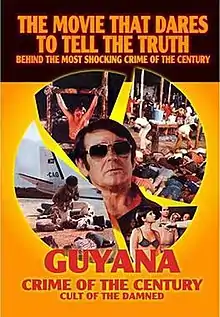| Guyana: Crime of the Century | |
|---|---|
 The current DVD cover features the two alternate English titles of the film | |
| Directed by | René Cardona Jr. |
| Written by | René Cardona Jr. |
| Starring | Stuart Whitman Gene Barry John Ireland Jennifer Ashley Bradford Dillman Joseph Cotten |
| Cinematography | Leopoldo Villaseñor |
| Edited by | Earl Watson |
| Music by | Jimmie Haskell Alfredo Díaz Ordaz |
| Distributed by | Universal Pictures |
Release dates |
|
Running time | 115 minutes (Mexico) 90 minutes (U.S.) 108 minutes (UK) |
| Country | Mexico |
| Language | English |
| Box office | $3,798,102[1] |
Guyana: Crime of the Century (also known as Guyana: Cult of the Damned) is a 1979 English-language Mexican exploitation drama film written and directed by René Cardona Jr. The film, which was shot in Mexico, is based on the Jonestown Massacre. It stars a number of American actors such as Stuart Whitman, Gene Barry and Joseph Cotten. The names of central characters are slightly tweaked from the historical ones: the film is set in "Johnsontown" rather than Jonestown, the cult is led by "Reverend James Johnson" (Whitman) rather than Rev. Jim Warren Jones, and the murdered Congressman is "Lee O'Brien" (Barry) rather than Leo Ryan.
Plot
In 1977, Reverend James Johnson, the fanatical and paranoid leader of an independent San Francisco church, moves his thousand-strong congregation to the jungles of Guyana. There, they will create their own utopia, free from the so-called corruption of the civilized world. Life at the commune, called "Johnsontown", becomes unbearable as Johnson turns to cruelty to keep his followers in line. In November 1978, California Congressman Lee O'Brien visits Johnsontown with a team of reporters to investigate reports of abuse and commune members being held against their will. Despite a positive facade that Reverend Johnson puts on for the congressman, the reality of the camp becomes apparent. When O'Brien leaves Johnsontown with a group of defectors, Johnson orders his loyal hit squads to kill O'Brien and the reporters, and then orders his followers to commit ritual mass suicide.[2]
Cast
- Stuart Whitman as Reverend James Johnson
- Gene Barry as Congressman Lee O'Brien
- John Ireland as Dave Cole
- Joseph Cotten as Richard Gable
- Bradford Dillman as Dr. Gary Shaw
- Jennifer Ashley as Anna Kazan
- Yvonne De Carlo as Susan Ames
- Nadiuska as Leslie Stevens
- Tony Young as Ron Harvey
- Erika Carlsson as Marilyn Johnson
- Robert DoQui as Oliver Ross
- Hugo Stiglitz as Cliff Robson
- Carlos East as Mike Sheldon
- Edith González as Commune member
Reception
Roger Ebert of the Chicago Sun-Times gave the film 0 out of 4 and wrote: "The movie brings absolutely no insights to Guyana. It exploits human suffering for profit. It is a geek show. Universal and its exhibitors should be ashamed."[3]
Historical inaccuracies
Most notably, the "Johnsontown" membership is largely cast with white actors, while in reality, and at its height, the majority (68%) of Peoples Temple members were African-American.[4]
Moreover, the film depicts "Susan Ames" (the fictionalized version of Peoples Temple loyalist Sharon Amos, as played by Yvonne De Carlo) being murdered, along with her children, by a shadowy, knife-wielding man. In reality, Sharon Amos—a hardcore supporter of Jim Jones stationed in nearby Georgetown—followed the orders of Jones for his followers to die on 18 November 1978. Amos reportedly took a kitchen butcher knife and slit the throats of her two youngest children (Christa, age 11, and Martin, age 10), then asked her eldest daughter Liane (age 21) to kill her with the knife, thus leaving Liane to kill herself.
As Johnson (Stuart Whitman) appears to expire from a gunshot, he pulls his shirt open by the lower four buttons. This is meant to reflect actual Jonestown death scene photos in which Jim Jones is seen lying on the pavilion floor with his red shirt open. The real reason Jones' shirt is open is unknown.
References
- ↑ Guyana: Crime of the Century at Box Office Mojo
- ↑ "Guyana: Crime of the Century". Time Out.com. Retrieved 10 June 2021.
- ↑ Ebert, Roger (29 April 2018). "Guyana-Cult of the Damned movie review (1980)". Chicago Sun-Times.
- ↑ "The Demographics of Jonestown – Alternative Considerations of Jonestown & Peoples Temple".